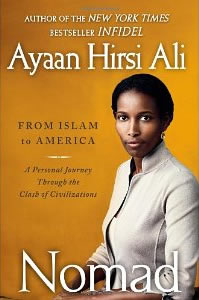Book Notes
 Ayaan Hirsi Ali, Nomad; From Islam to America, A Personal Journey Through the Clash of Civilizations (New York: Free Press, 2010), 277pp.
Ayaan Hirsi Ali, Nomad; From Islam to America, A Personal Journey Through the Clash of Civilizations (New York: Free Press, 2010), 277pp.
In this follow-up to her best seller Infidel (2007), Ayaan Hirsi Ali (born 1969) combines compelling personal story-telling about repudiating Islam with more controversial political analysis about whether Muslims can embrace modernity. Ali was born in Somalia, moved to Saudi Arabia when she was eight, fled to Ethiopia when her family was expelled from there, then moved again to Kenya. During those years she was a pious Muslim, but when her father forced her into an arranged marriage with a distant cousin she had never met, she fled to Germany and then in 1992 gained asylum in Holland. In Holland Ali learned Dutch, went to college, became an interpreter at abortion clinics, schools, prisons, courts, and shelters for battered women, and, most improbably, became a member of the Dutch Parliament. After significant controversies in Holland, she moved to the United States and took a post at the American Enterprise Institute.
Ali identifies herself as an atheist, an outspoken critic of Islam, and an enthusiastic proponent of the political legacy of the secular Enlightenment. She has harsh words for multi-culturalists, self-censorship, and politically-correct politeness that refuses to criticize Islamic practices like honor killings and female genital mutilation, all in the name of religious or cultural parity. College campuses, she says, are the worst in this regard. "All human beings are equal, but all cultures and religions are not. A culture that celebrates femininity and considers women to be the masters of their own lives is better than a culture that mutilates girls' genitals and confines them behind walls and veils or flogs or stones them for falling in love" (212–213). To criticize Islam, she insists, is not to defame all Muslims.
What's not clear is the extent to which Ali thinks that Muslims, particularly those from nomadic-tribal cultures, can integrate into Western societies. On the one hand, she rejects the patronizing "defeatist approach" that is "hopeless." We shouldn't imply that Muslims are "incapable of growth and adaptation; I can't think of anything more pejorative and racist" (232). On the other hand, she writes that Islam is "fatally flawed" (273), and that you can be both Muslim and American "only if you don't care very much about being Muslim" (139, 140). She thus concludes, "I believe it would be a grave mistake to be complacent about Islam in America" (139). Ali's voice of experience can be powerful, but her extrapolations of political generalizations from her experiences need more careful nuance.


